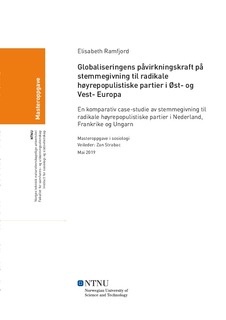| dc.description.abstract | The theme of this thesis is how the consequences of globalization can affect the support of radical right-wing populist parties, and I investigate how different causal factors affect the support for such parties, in three cases. Two of these cases are the Western European countries France and the Netherlands, and the third are the Eastern European country Hungary. Four different radical right-wing parties are investigated in this thesis: Front National in France, Party for Freedom in the Netherlands and Jobbik and Fidesz in Hungary. The three causal factors that I use to explain support for these parties are: economic and political globalization, attitudes towards immigrants, discontent with the situation in countries and distrust towards political institutions. These causal factors are in my thesis viewed as demand side factors, that increases the demand for radical-right wing parties. With regards to economic and political globalization my main focus is how some people become the winners and others become the losers in such processes. To explain how negative attitudes towards immigrants occur I apply Blumer’s group position theory, and theories to explain how media plays a role in the production and reproduction of negative attitudes towards immigrants. I also use protest-voting theory, anti-establishment theory and the theory of Euroscepticism to explain how consequences of cultural, political and economic globalization contributes to higher levels of discontent and distrust. I use a comparative case-study to analyze the differences around the causes of why people cast a vote for radical right-wing populist parties. Through this method I will have the opportunity to point out similarities and differences between the three cases by looking more closely at the countries' history and situation today. The data is collected from European Social Survey round 8 from 2016, and I use multinominal logistical regression to analyze the findings. In my analysis I find effect on all three of the indicators that show that the effects of globalization in all my countries have an effect for support to the radical right-wing parties. My results show that a constant across the four cases is that negative attitudes towards the European Union and immigrants have an effect for voting for such parties, but that the reason for negative attitudes differ in each country. Another important finding is that the results for the two parties in Hungary show that people who are satisfied with the political and economic situation have a higher chance of voting for Jobbik and Fidesz. This finding goes against earlier research and the results I find for the Netherlands. | nb_NO |
